In today’s evolving economy, the rise of socially driven businesses has reshaped the definition of success. London, a global financial and cultural hub, is also emerging as a breeding ground for companies that blend profit with purpose.
These organisations, known as social companies, aim to make a tangible impact whether that’s improving local communities, promoting sustainability, or driving inclusive innovation.
This blog highlights the top ten social companies in London and explores how they are setting new standards in ethical business practices, sustainability, and community empowerment.
What Makes a Company “Social” in the London Business Scene?

A social company is not defined solely by profit margins but by the positive effect it creates in society. In the London context, these companies typically operate with a dual mission: achieving business growth while addressing pressing social or environmental challenges.
Unlike traditional enterprises, these businesses often reinvest their profits into community projects, adopt inclusive employment practices, or design products and services that tackle real-world problems. Many are structured as Community Interest Companies (CICs), certified B Corps, or part of the expanding social enterprise movement.
In London, this trend is fuelled by a combination of socially conscious consumers, progressive investors, and a thriving ecosystem of innovation hubs and accelerators focused on impact-driven businesses.
Why Are London’s Social Enterprises More Relevant Than Ever?

The urgency of climate change, inequality, and economic instability has prompted both consumers and corporations to rethink their values. In London, there has been a noticeable shift in consumer expectations people want to buy from brands that care about more than just their bottom line.
Social companies are stepping up to meet this demand, embedding values like sustainability, fairness, and community in every aspect of their operations. As a result, they’re gaining not only public trust but also competitive advantages in today’s ethically minded market.
The rise of ESG (Environmental, Social, Governance) criteria has further pushed businesses to adopt transparent, sustainable strategies, making social enterprises in London a core part of the city’s economic future.
Which Are the Top 10 Social Companies Making a Real Impact in London?
1. Belu Water – “Drinking Water, Delivering Change”
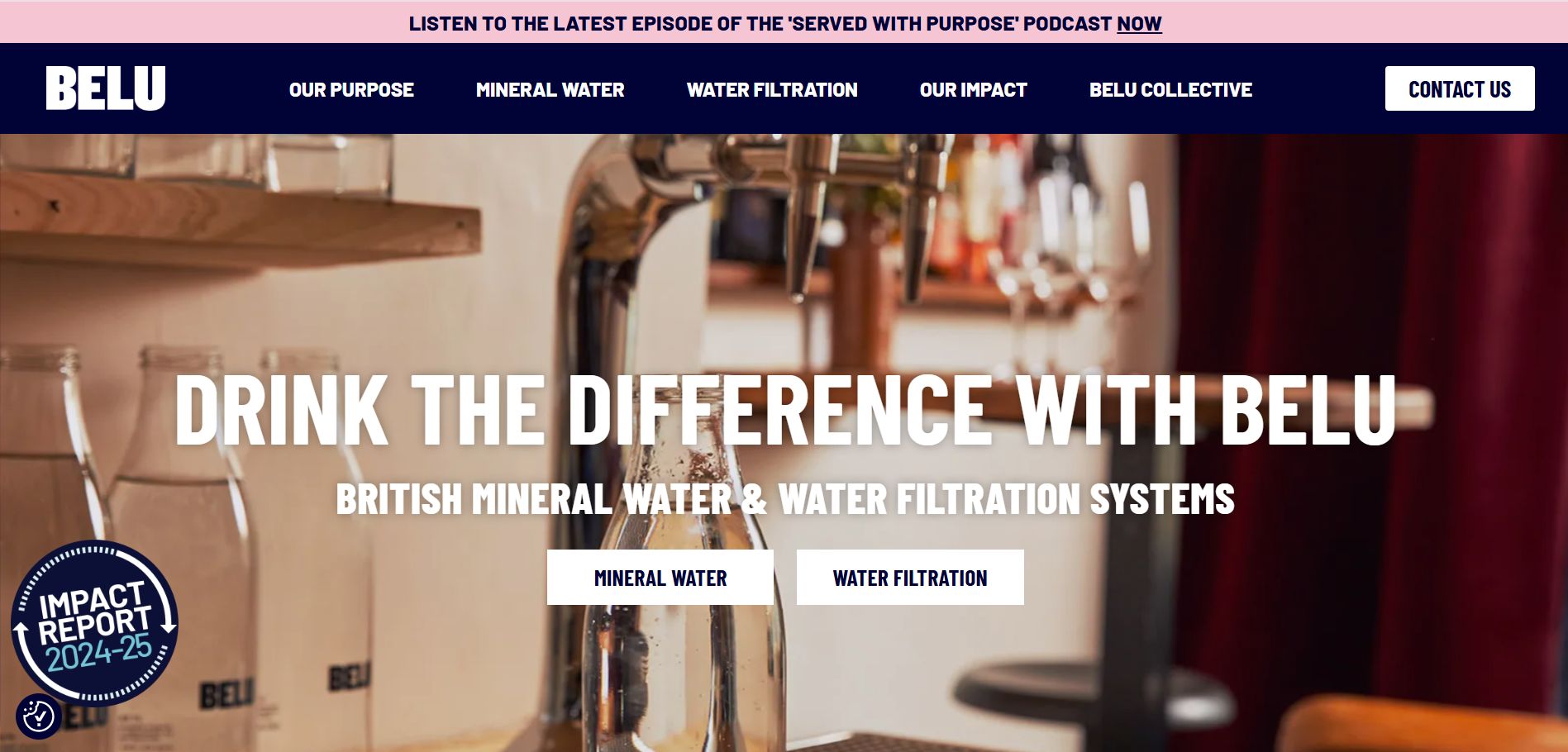
Belu Water is one of London’s most respected ethical water brands. It operates by donating 100% of its profits to WaterAid, providing access to clean water in developing countries.
The company’s carbon-neutral production process and sustainable packaging have made it a go-to supplier for hospitality venues wanting to reduce their environmental footprint. Belu does not sell directly to individuals but focuses on wholesale clients, especially hotels and restaurants.
Its model proves that scaling a product doesn’t have to compromise on values. With transparent reporting and a strong environmental commitment, Belu is setting a high bar in social enterprise.
It is often cited as a pioneer in combining ethics and excellence in business. Their operations in London are deeply integrated with sustainable development goals.
Specialty – Environmental Innovation
Focused on sustainable bottling and carbon-neutral logistics.
Best For – Hospitality Partnerships
Ideal for hotels and venues wanting ethical beverage solutions.
Pricing: Wholesale pricing only, based on B2B contracts.
- Website: https://belu.org
- Phone: +44 (0)20 7928 1600
- Address: 3rd Floor, 61 Southwark Street, London SE1 0HL
- Email: info@belu.org
Review: ★★★★★
“Our hotel uses Belu exclusively now it aligns with our sustainability goals and the service is outstanding.”
2. The Big Issue – “A Hand Up, Not a Handout”
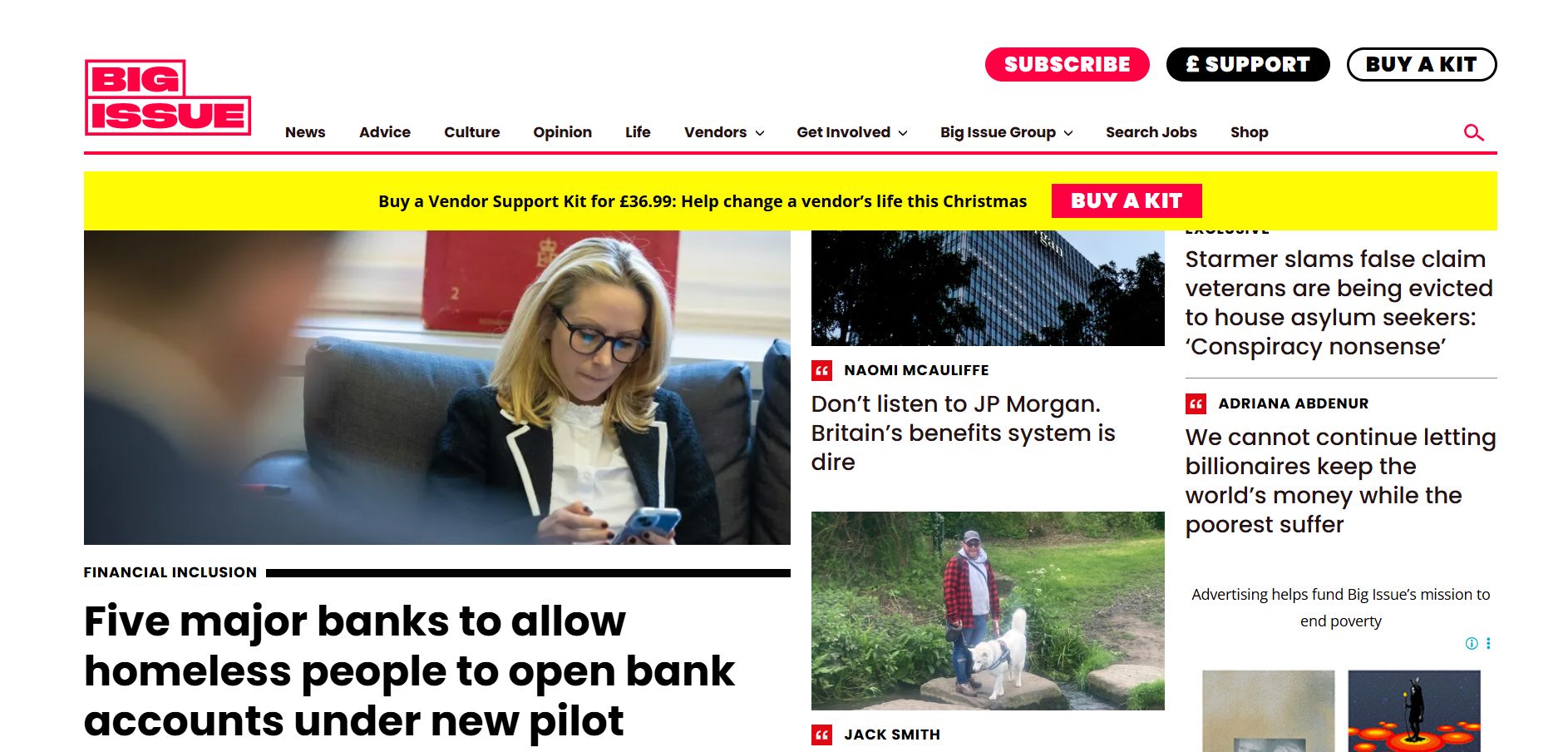
Founded in London in 1991, The Big Issue is one of the UK’s most recognised social enterprises. It empowers homeless and vulnerably housed individuals by offering them the opportunity to earn an income selling magazines. Vendors buy magazines at a low wholesale rate and keep the profits from each sale.
The model is built on dignity and self-sufficiency rather than charity. The organisation also runs a foundation offering housing, employment, and health support.
Its publishing arm covers topics from politics to pop culture, always with a strong social lens. The Big Issue’s approach has influenced social entrepreneurship globally. In a city as economically divided as London, its impact remains critical.
Specialty – Social Empowerment
Builds livelihoods through self-employment for the homeless.
Best For – Conscious Consumers
Supports street vendors while delivering great journalism.
Pricing: £4 per issue; £2 goes directly to the vendor.
- Website: https://www.bigissue.com
- Phone: +44 (0)20 7526 3200
- Address: 113–115 Fonthill Road, Finsbury Park, London N4 3HH
- Email: enquiries@bigissue.com
Review: ★★★★☆
“Always look for my local vendor it’s more than just a magazine, it’s a small act of support that really matters.”
3. Divine Chocolate – “Fairer Chocolate for a Sweeter World”

Divine Chocolate stands out not only for its rich, delicious flavours but also for its unique ownership model co-owned by the cocoa farmers in Ghana who grow its beans. The company is committed to fair trade and ethical sourcing, ensuring that farmers are paid fairly and have a voice in governance.
Divine is a certified B Corp and has been part of the UK’s ethical business movement for over two decades. Their chocolate contains no palm oil, and packaging is recyclable, aligning with sustainability goals. Based in London, they distribute their products through major retailers and independent shops.
The brand champions gender equality in cocoa farming and runs educational programmes for producers. Divine combines premium quality with purpose in every bar.
Specialty – Ethical Ownership
The farmers own shares in the company and guide key decisions.
Best For – Fair Trade Enthusiasts
Great for buyers who want quality chocolate with impact.
Pricing: Around £2.50–£3.00 per bar, depending on variety and retailer.
- Website: https://www.divinechocolate.com
- Phone: +44 (0)20 7405 8560
- Address: 4 Gainsford Street, London SE1 2NE
- Email: info@divinechocolate.com
Review: ★★★★★
“It’s some of the best chocolate I’ve tasted and I love that it’s supporting real farmers.”
4. Too Good To Go – “Save Food, Save the Planet”
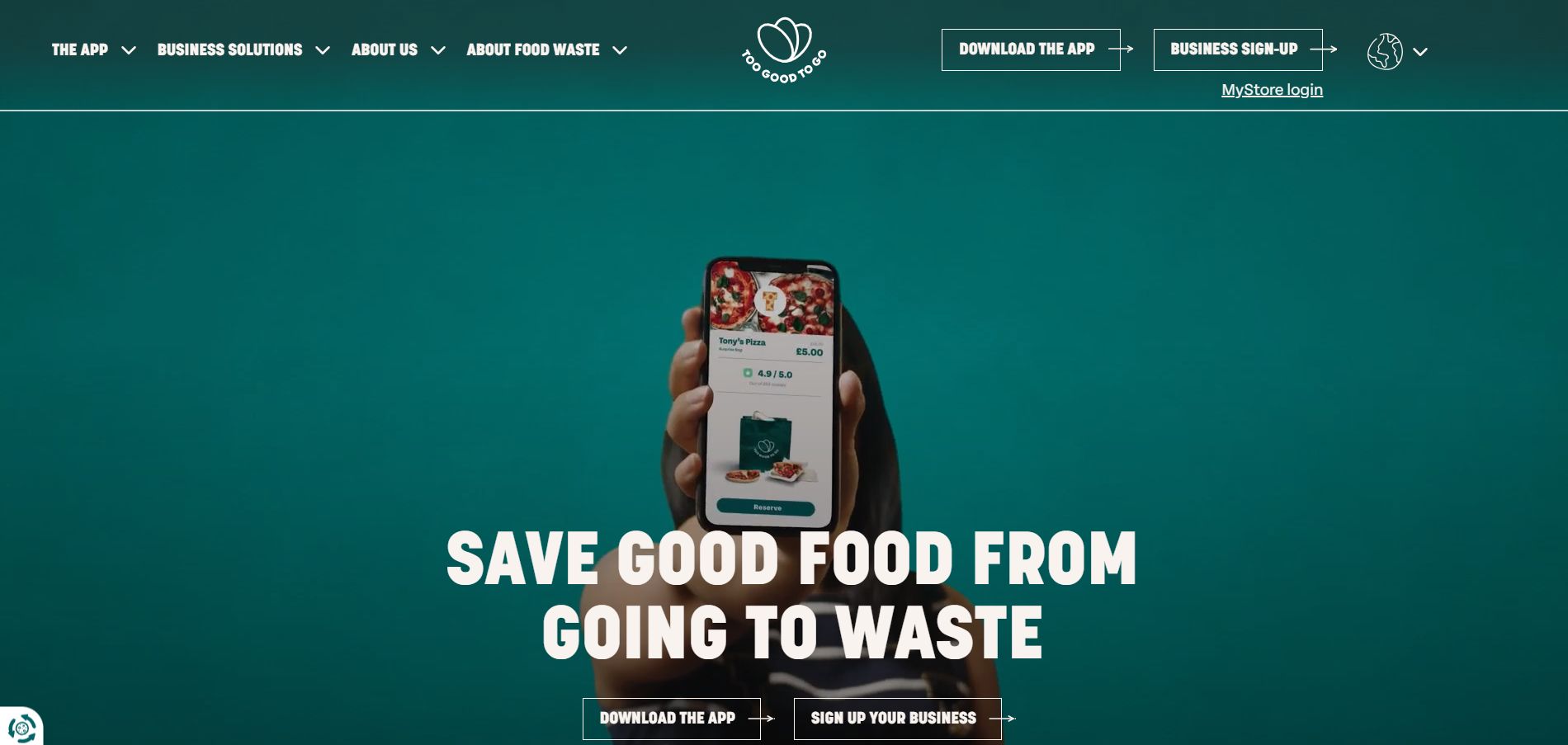
Too Good To Go is a mobile app and social enterprise based in London that tackles food waste head-on. It connects users with restaurants, bakeries, and grocery stores offering surplus food at discounted prices. The app enables businesses to reduce their environmental impact while consumers get meals for a fraction of the cost.
Its “Magic Bags” offer surprise assortments of unsold items, adding excitement and accessibility to food rescue. With millions of users in the UK, it has become a daily tool for eco-conscious Londoners. Too Good To Go also runs awareness campaigns and school initiatives.
Their model reduces food waste at scale while keeping operations profitable. It is one of the most successful examples of tech for good in the city.
Specialty – Food Waste Tech
Technology-driven platform targeting surplus food distribution.
Best For – Budget-Conscious Foodies
Ideal for Londoners looking to save money and reduce waste.
Pricing: Magic Bags typically range from £2.50 to £5.
- Website: https://toogoodtogo.co.uk
- Phone: Not listed publicly
- Address: 1 Vine Street, London W1J 0AH
- Email: info@toogoodtogo.co.uk
Review: ★★★★☆
“I’ve discovered new restaurants and saved money plus, I feel good reducing waste.”
5. OLIO – “Share More. Waste Less.”
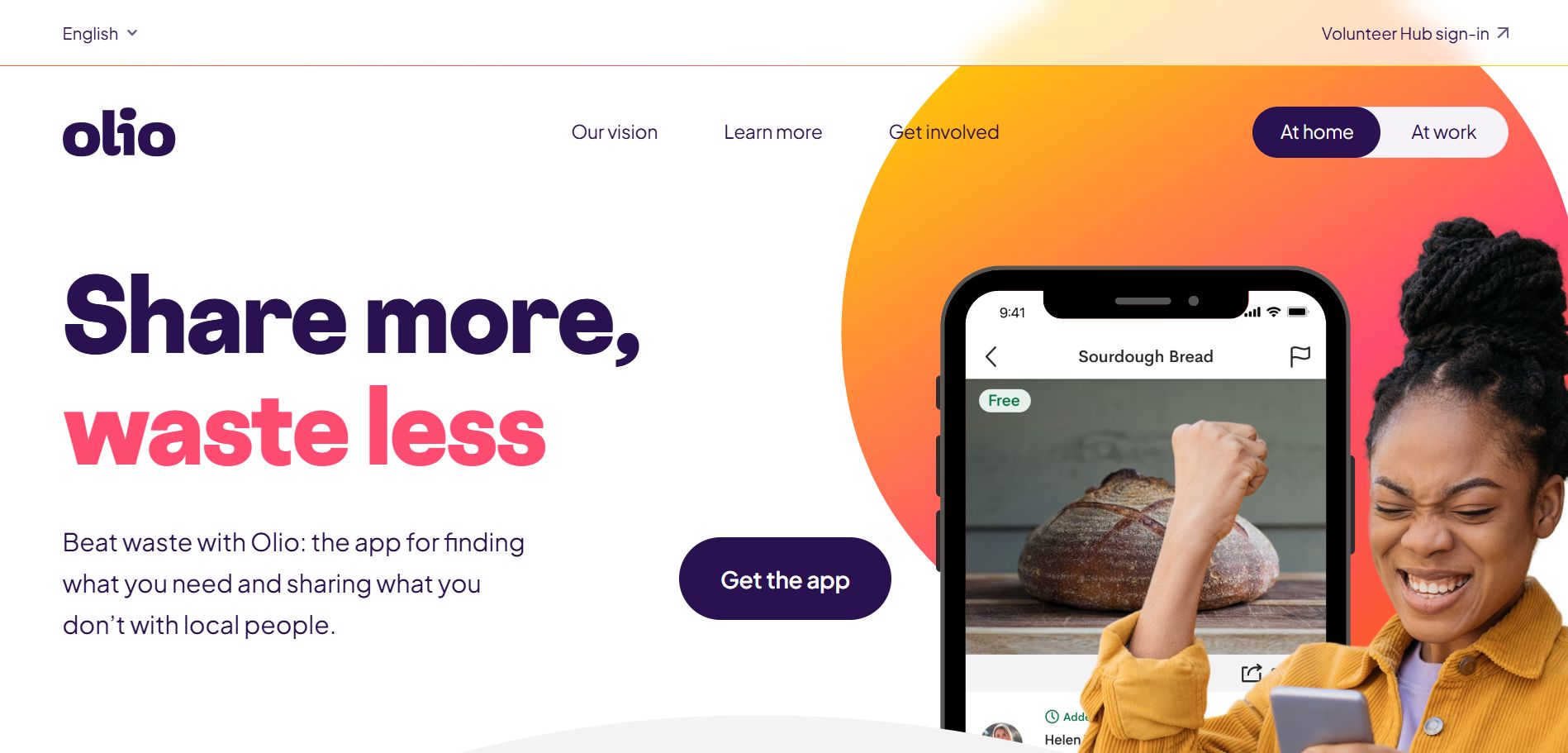
OLIO is a London-based social app designed to fight waste and build community by encouraging neighbours and local businesses to share excess food and household items. Everything listed on OLIO is free, from sealed groceries to leftover meals.
The platform also mobilises volunteers known as “Food Waste Heroes” to collect unsold food from stores and redistribute it. OLIO’s mission centres on reducing landfill waste and strengthening human connections through sharing. It operates globally but has a deep footprint in London, where thousands of daily listings appear.
The app is intuitive and backed by strong community guidelines. OLIO represents a new form of grassroots environmentalism with real-world impact. Its role in supporting low-income households during tough times is increasingly important.
Specialty – Peer-to-Peer Sharing
Facilitates local exchange of surplus food and goods.
Best For – Zero-Waste Advocates
Great for those who want to reduce waste and share within their community.
Pricing: Free for individuals and users.
- Website: https://olioex.com
- Phone: Not listed
- Address: 2 Underwood Row, London N1 7LQ
- Email: hello@olioex.com
Review: ★★★★★
“I’ve met amazing people while saving perfectly good food. It’s a brilliant app with real heart.”
6. Toast Ale – “Brewed with Bread to Save the Planet”
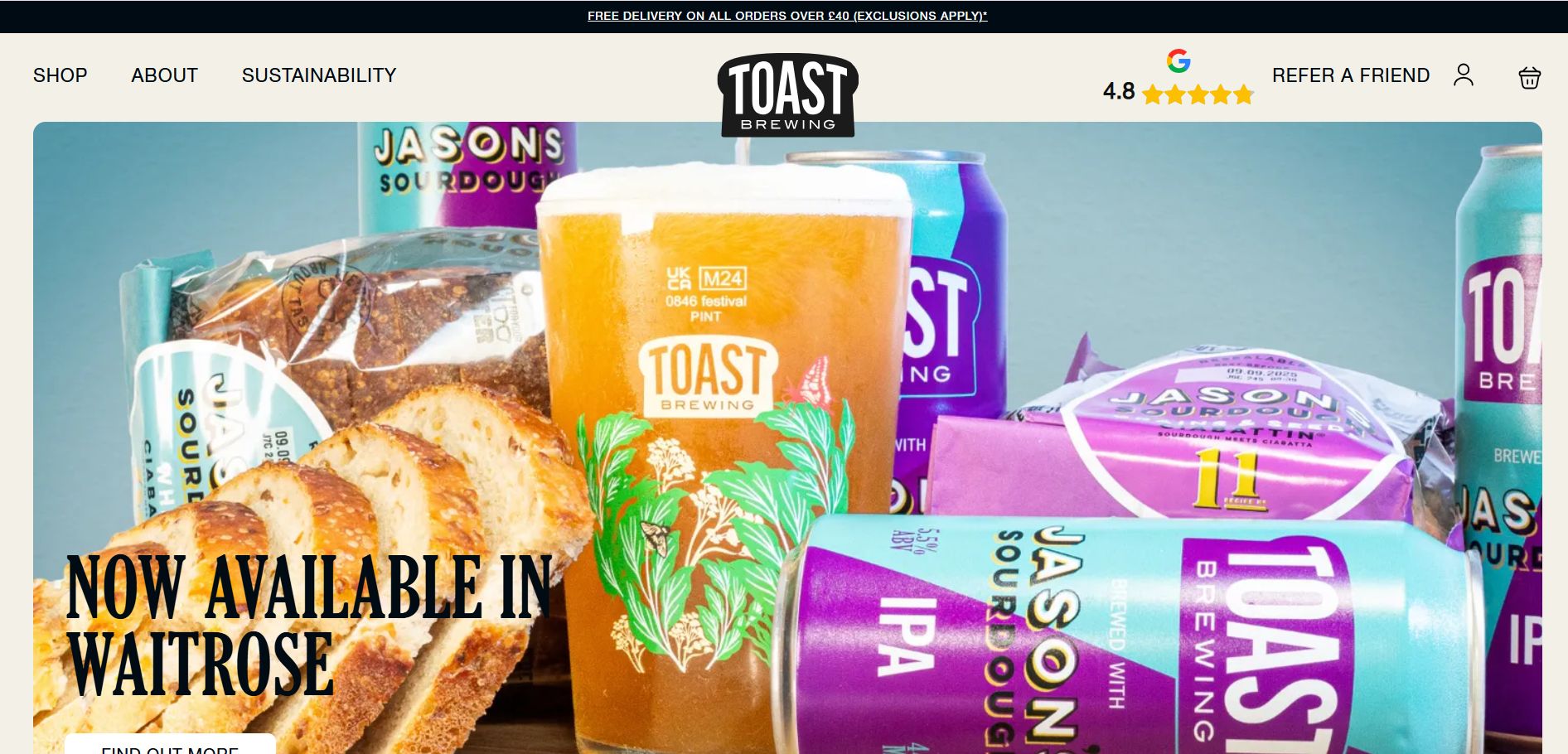
Toast Ale is a London-based brewery that crafts award-winning beer using surplus bread that would otherwise go to waste. Their mission is rooted in sustainability tackling food waste at scale while producing premium craft beverages. Instead of using virgin barley, Toast replaces up to one-third of the grain with unsold fresh bread from bakeries and sandwich makers.
The company donates all profits to environmental charities working to fix the food system. Toast is a certified B Corp and is transparent about its carbon impact and supply chain.
The brand has grown from a grassroots project into a well-respected player in the ethical drinks market. Based in South London, they also run public education campaigns on food waste.
Specialty – Circular Brewing
Upcycles surplus bread into beer, reducing food waste.
Best For – Eco-Conscious Drinkers
Perfect for craft beer lovers who support environmental causes.
Pricing: Bottles start at £2.50; multi-packs and subscriptions available online.
- Website: https://www.toastale.com
- Phone: +44 (0)20 3637 9912
- Address: 5–7 Tanner Street, London SE1 3LE
- Email: info@toastale.com
Review: ★★★★★
“Not only is the beer top quality, but it’s amazing to know it’s fighting food waste too.”
7. Change Please – “Coffee That Changes Lives”
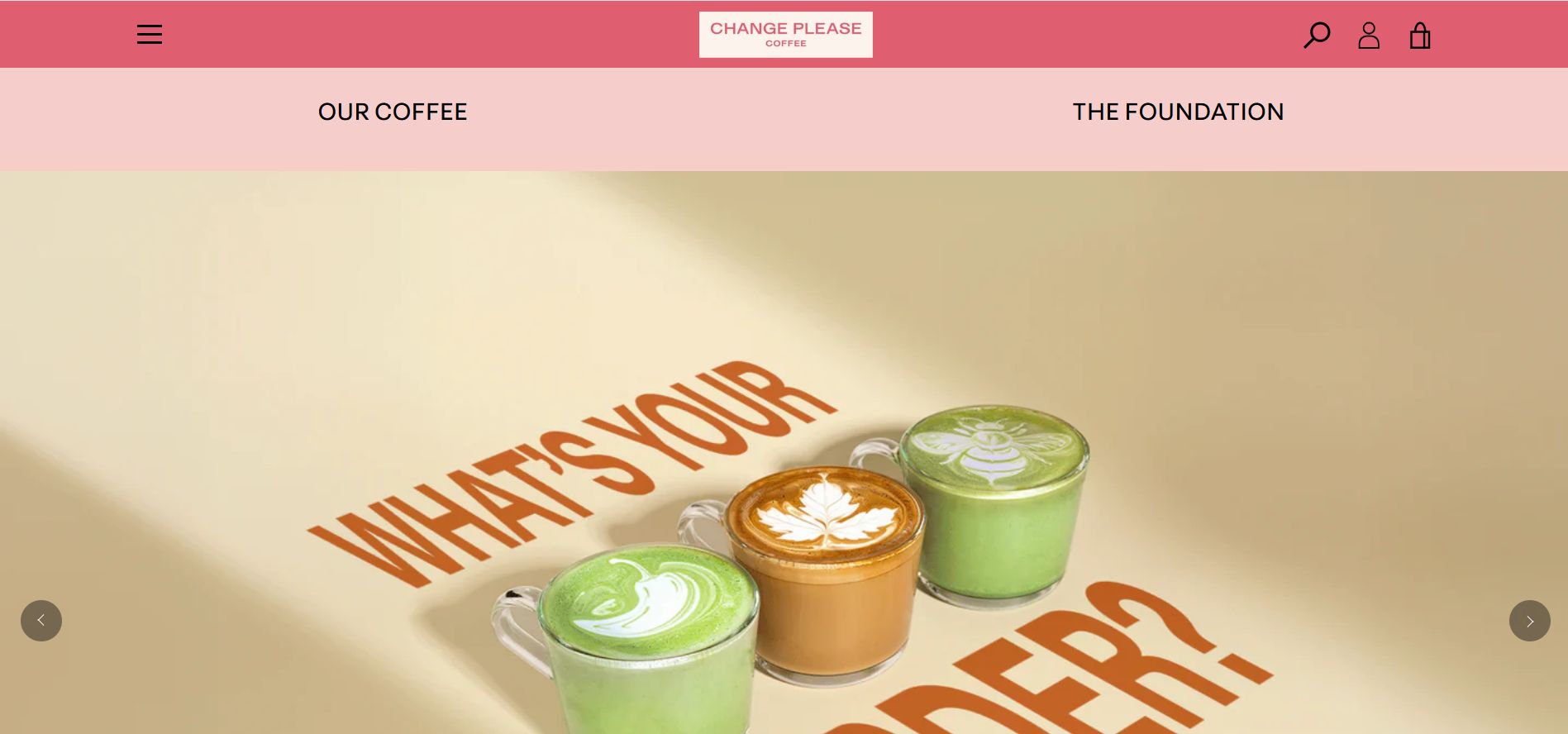
Change Please is a coffee company doing far more than brewing good coffee. it’s ending homelessness, one cup at a time. Based in London, the enterprise trains homeless individuals to become professional baristas, providing a London living wage, housing support, therapy, and job placement.
Their coffee is ethically sourced and roasted in the UK, sold through mobile coffee carts, cafés, and supermarkets like Sainsbury’s. Change Please reinvests profits to expand its support services.
The company has received numerous awards and recognition from social enterprise networks and the Mayor of London. Their baristas often have powerful personal stories, transforming customer interactions into moments of social awareness. It’s coffee with a cause and it’s seriously good coffee too.
Specialty – Social Barista Training
Empowers homeless individuals with skills and employment.
Best For – Purpose-Driven Caffeine Lovers
Great for those who want every coffee to count.
Pricing: £2.50–£3.50 for drinks; beans available from £6.50.
- Website: https://changeplease.org
- Phone: +44 (0)20 3095 9625
- Address: 1 Thornton Street, London SW12 0LF
- Email: info@changeplease.org
Review: ★★★★★
“I grab a coffee from their cart every morning it tastes better knowing it’s helping someone rebuild their life.”
8. Thrive London – “Mental Health Starts with Community”
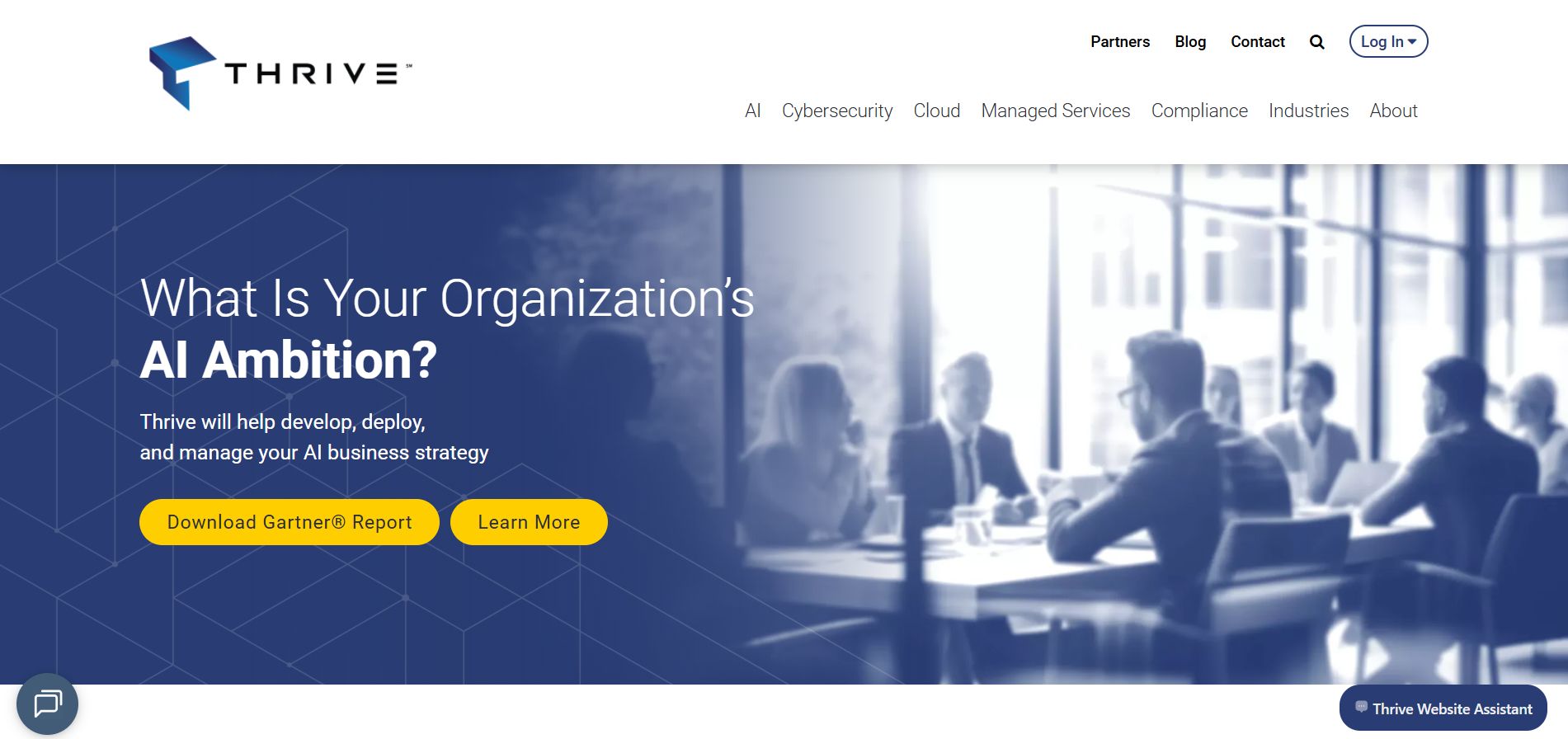
Thrive London is a citywide social movement focused on improving mental health and wellbeing across all London boroughs. Supported by the Mayor of London and various NHS trusts, Thrive works collaboratively with local councils, charities, and grassroots organisations.
They deliver mental health workshops, community forums, suicide prevention training, and public awareness campaigns. Thrive’s approach is inclusive, culturally sensitive, and community-led. The initiative targets systemic issues like loneliness, trauma, and inequality, especially in underserved areas.
By empowering communities to talk about mental health openly, Thrive fosters resilience and support at a local level. Their work has become increasingly crucial in a post-pandemic London, where mental health services are stretched and awareness is growing.
Specialty – Mental Wellness Outreach
Builds mental health resilience through community collaboration.
Best For – Local Councils and Charities
Ideal for organisations and individuals promoting mental wellbeing.
Pricing: Free public access to most services and events.
- Website: https://thriveldn.co.uk
- Phone: Not publicly listed
- Address: City Hall, Kamal Chunchie Way, London E16 1ZE
- Email: info@thriveldn.co.uk
Review: ★★★★☆
“Their community events and resources have helped my organisation better support vulnerable residents.”
9. B Lab UK – “Redefining Success in Business”
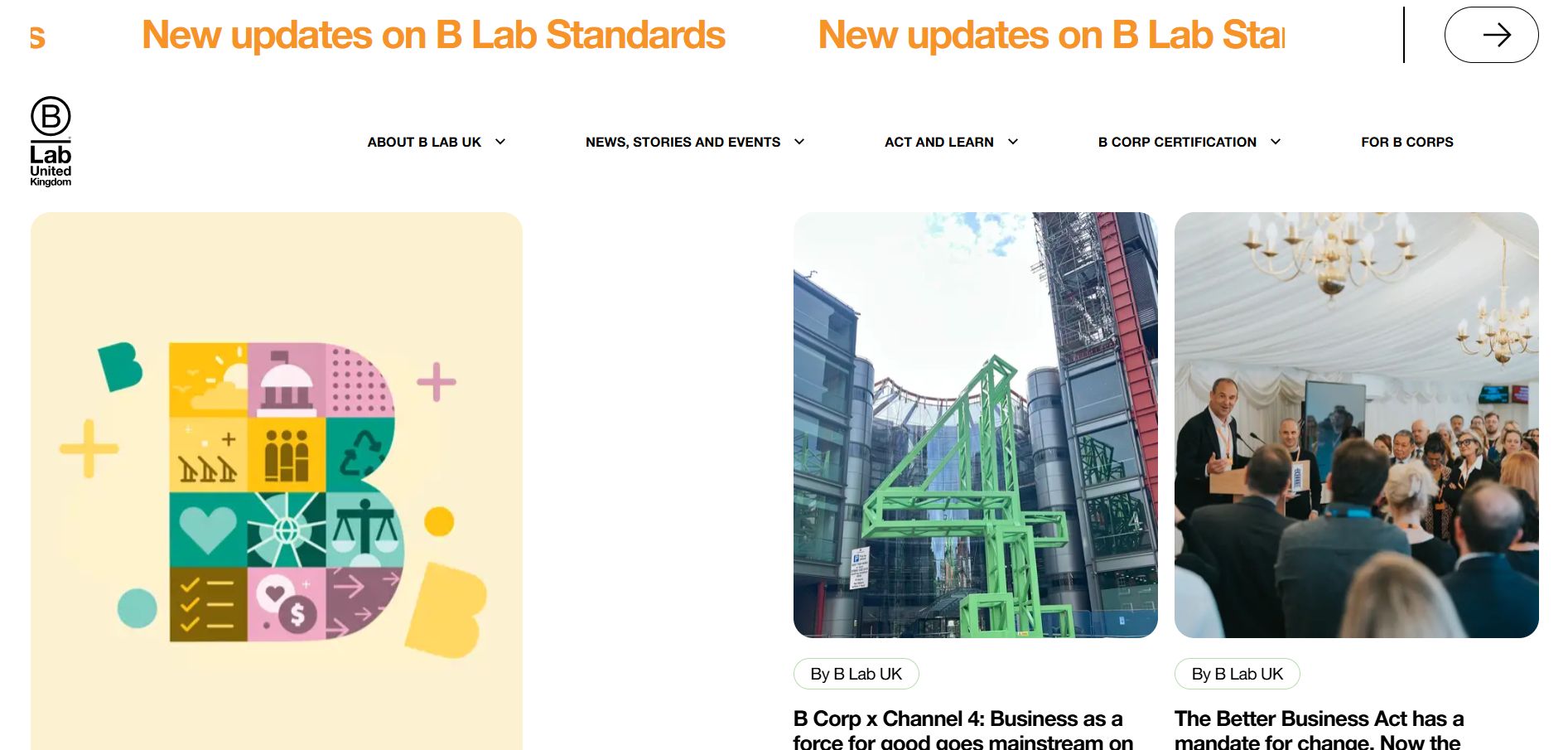
B Lab UK is the official body that certifies B Corporations businesses that meet the highest standards of social and environmental impact. Based in London, B Lab UK is part of the global B Corp movement, advocating for systemic change in how companies measure success.
Their certification process is rigorous, analysing governance, workers’ rights, environmental policies, and community impact. B Lab also offers training, resources, and networking opportunities for businesses looking to improve their sustainability credentials.
Through advocacy and education, B Lab has helped create a business culture where purpose and profit align. The organisation is instrumental in supporting companies like Toast Ale and Divine Chocolate to scale responsibly. Their presence in London is key to building a better business ecosystem.
Specialty – Certification & Advocacy
Accredits businesses based on ethical and sustainable practices.
Best For – Impact-Driven Entrepreneurs
Perfect for leaders seeking formal recognition for ethical practices.
Pricing: Varies based on company size; annual certification fee applies.
- Website: https://bcorporation.uk
- Phone: +44 (0)20 3962 5080
- Address: 6–8 Bonhill Street, London EC2A 4BX
- Email: info@bcorporation.uk
Review: ★★★★★
“Getting B Corp certified through B Lab gave our brand credibility and opened doors to new partnerships.”
10. Rubies in the Rubble – “Turning Waste into Taste”
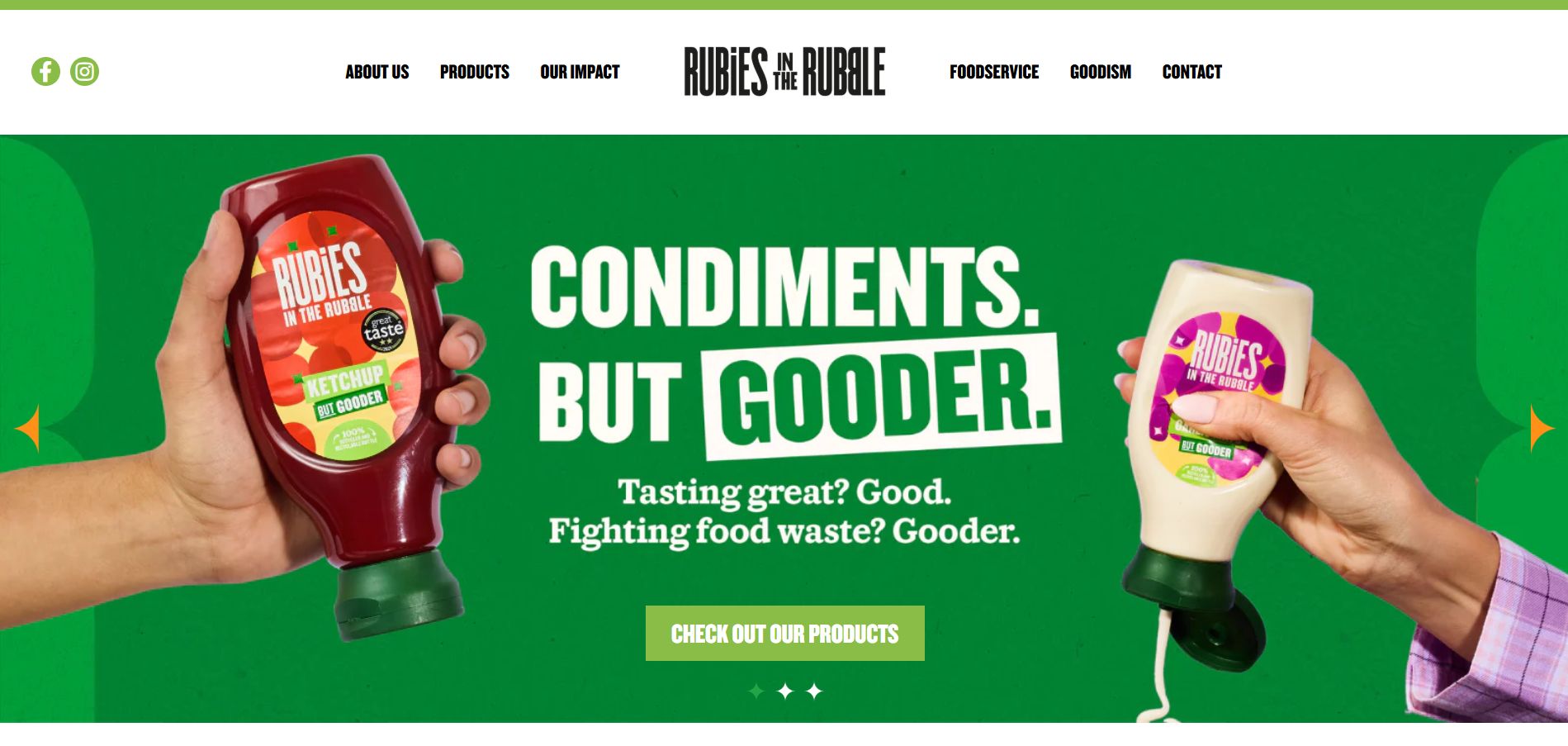
Rubies in the Rubble creates award-winning condiments using ingredients that would otherwise be discarded due to appearance or oversupply. The company was founded in London to address the massive food waste problem in the UK.
By sourcing “wonky” or surplus produce, Rubies makes everything from ketchups to relishes without compromising on taste. The products are vegan, all-natural, and made in the UK.
As a certified B Corp, Rubies commits to reducing its carbon footprint and improving food system sustainability. Their branding is playful but their mission is serious: turning discarded food into delicious, eco-friendly alternatives. Stocked in Waitrose, Whole Foods, and online, the brand is becoming a household staple for conscious eaters.
Specialty – Upcycled Ingredients
Creates premium condiments from food that would go to waste.
Best For – Ethical Food Shoppers
Ideal for shoppers who care about sustainability and flavour.
Pricing: £2.99–£3.99 per jar; multi-pack options online.
- Website: https://rubiesintherubble.com
- Phone: Not publicly listed
- Address: 3Space International House, Canterbury Crescent, London SW9 7QE
- Email: hello@rubiesintherubble.com
Review: ★★★★★
“The ketchup is amazing better than big brands and way better for the planet.”
How Do Social Companies Shape London’s Communities?

One of the most significant contributions of social companies is their investment in community wellbeing. In many London boroughs, these businesses offer training, employment, and services to people who face social exclusion, such as ex-offenders, refugees, and the homeless.
By working closely with local councils, non-profits, and grassroots organisations, social companies help regenerate areas that are often overlooked by traditional businesses. Their impact is not just economic but emotional they foster a sense of purpose, inclusion, and resilience among those they support.
In this way, social enterprises operate as both employers and community catalysts, creating circular benefits that ripple through London’s diverse population.
What Role Does Sustainability Play in These Business Models?

Sustainability is at the heart of many social companies in London. Whether through carbon-neutral operations, waste reduction strategies, or ethical sourcing, these businesses embed environmental consciousness into their core DNA.
Companies like Toast Ale and Rubies in the Rubble directly address food waste, a pressing global issue, by turning surplus ingredients into marketable products. Others, like Belu Water, use eco-friendly packaging and carbon-neutral logistics to reduce their environmental footprint.
Sustainability is not an afterthought; it is a foundational pillar. This focus not only helps the environment but also resonates with eco-conscious consumers, investors, and policymakers who expect transparency and accountability.
Are Ethical Startups Redefining the Business Landscape in London?

The startup scene in London has seen a powerful shift. Once driven purely by innovation and scalability, startups are now equally focused on ethics and impact. Organisations like OLIO and Too Good To Go emerged as disruptive startups but are now leading examples of ethical innovation.
These startups blend technology with social responsibility, enabling scalable solutions to issues like food insecurity, loneliness, or environmental degradation. Their success proves that businesses can grow rapidly without compromising on values.
Moreover, London’s accelerators and venture capital funds are increasingly favouring impact-led startups, opening doors for ethical entrepreneurs to gain both visibility and funding.
How Can Individuals and Businesses Collaborate With Social Companies?
There are numerous ways Londoners individuals and organisations alike—can support or work with social companies. As consumers, making conscious purchasing decisions by choosing products and services from ethical companies can directly fuel their growth.
For businesses, collaboration can take the form of sourcing from social suppliers, funding their missions through corporate donations, or even embedding them into supply chains. For example, office catering can be sourced from a social food enterprise, or coffee stations can partner with companies like Change Please.
Engagement is also educational: attending social impact events, volunteering, or learning from B Corps can help both individuals and corporations rethink their role in the economy.
What Challenges Do London’s Social Companies Face Today?

Despite their growing influence, social companies face several obstacles. Access to funding remains a significant hurdle, particularly for startups that prioritise impact over rapid profit.
Regulatory frameworks can also be limiting. Many social enterprises operate in legal grey areas where they’re neither fully commercial nor fully charitable, complicating compliance and scalability.
There’s also the issue of visibility. Social companies often lack the marketing budgets of mainstream businesses, making it harder to communicate their value to wider audiences. That’s where platforms like Companies.London come into play by helping highlight the most innovative and impactful organisations across the city.
Overview of Top 10 Social Companies in London
| Company Name | Sector | Core Mission | B Corp Status | HQ Location |
| Belu Water | Water & Beverage | 100% profits to clean water projects | No | London Bridge |
| The Big Issue | Publishing | Empowering the homeless | No | King’s Cross |
| Divine Chocolate | Food & Beverage | Fair trade chocolate co-owned by farmers | Yes | Hammersmith |
| Too Good To Go | Food Tech | Fight food waste | No | Shoreditch |
| OLIO | Tech / Food Sharing | Reduce food and household waste | No | Camden |
| Toast Ale | Brewing | Craft beer from surplus bread | Yes | Southwark |
| Change Please | Coffee / Social | Employ homeless as baristas | No | Elephant & Castle |
| Thrive London | Mental Health | Improve mental wellbeing city-wide | No | City of London |
| B Lab UK | Certification Org | Promote B Corporations in the UK | Yes | Holborn |
| Rubies in the Rubble | Condiments | Make food from surplus produce | Yes | Hackney |
Conclusion
As London continues to evolve as a modern, ethical city, social companies are becoming the heartbeat of this transformation. They are not only proving that business can be a force for good, but they are actively redefining success through sustainability, inclusion, and purpose.
For Londoners whether business leaders, consumers, or policymakers now is the time to embrace and uplift these companies. Their work today shapes a better, fairer tomorrow.
FAQs
What qualifies a business as a social company in the UK?
A social company is typically defined by its core mission to create social or environmental change, often reinvesting profits into those efforts rather than distributing them to shareholders.
Are all social companies in London structured as CICs or B Corps?
No. While many adopt structures like Community Interest Companies or pursue B Corp certification, others operate as limited companies with social objectives clearly defined in their governance.
How do social companies measure success differently from traditional businesses?
Instead of focusing solely on profit, they also track social and environmental impact metrics—like number of people helped, CO₂ reduction, or amount of waste diverted.
Is it possible for social companies to scale and remain mission-driven?
Yes, though it requires strong governance and investor alignment. Successful examples like OLIO and Change Please show that scaling and impact can go hand in hand.
Can regular consumers make a difference by supporting these businesses?
Absolutely. Every purchase is a vote. Supporting social companies helps them grow and reinvest in their missions, creating a positive feedback loop of impact.
What industries are most represented in London’s social enterprise space?
Food, tech, education, mental health, and retail are some of the most active sectors for social innovation in London.
Are there government incentives for starting a social enterprise in London?
Yes. Schemes like the Social Enterprise Support Fund and various local council initiatives offer grants and mentorship for early-stage social ventures.
